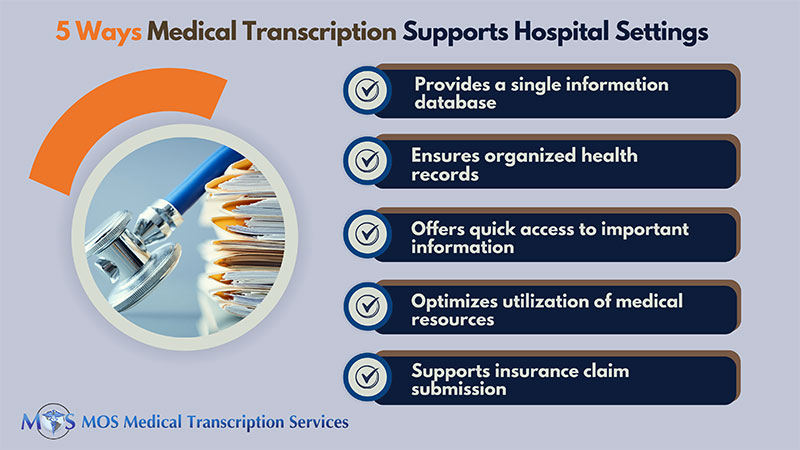
Table of Contents
In the hectic, fast-moving world of a hospital, every second counts. Accurate documentation and efficient communication are essential to providing the best possible patient care. In this complex setting, medical transcription services are a vital component for a smooth workflow. Having expert documentation support allows hospitals to maintain an extensive and current patient data repository in addition to addressing the difficulty of organizing large volumes of spoken information.
Role of Medical Transcription in Hospitals
Transcription of medical dictations serves as an essential link between spoken medical information and comprehensive, easily accessible records in a hospital setting, where time is of the essence and accuracy is non-negotiable. It helps maintain complete patient histories and guarantees correct transcription of important information for future use, including diagnoses, treatment plans, and prescriptions. Physicians can focus on patient care, diagnosis, and treatment by outsourcing the transcription of their dictated notes. This improves patient outcomes in addition to increasing the effectiveness of the medical team. Easily accessible and well-organized transcriptions foster a collaborative and knowledgeable approach to healthcare delivery, providing a shared forum for physicians, nurses, and other medical professionals to evaluate and discuss patient cases.
5 Ways Medical Transcription Enhances Hospital Operation

- A Single Information Database: By ensuring accurate digital records, transcription makes information accessible to all. Hospitals can exchange information with other hospitals, administration, and medical staff using a single database. A repository like this also improves the efficiency of document editing, searching, and printing. Patients can access data wherever and whenever needed.
- Obtain Organized Health Records: Medical experts or specialists typically use recorders to capture their conversations with patients regarding their analysis, recommendations, findings, and procedures. A medical transcriptionist receives the recordings and works on them to transform them into written documents. This demonstrates how important medical transcribing is. Additionally, they ensure that the terminology and abbreviations prescribed by the licensed medical expert are written correctly and without errors.
- Quicker Access to Information Recall: Information between patients and doctors can be easily communicated when medical transcripts are properly formatted. Particularly in an emergency, medical professionals require immediate access to a patient’s medical history, including past prescription usage, allergies, surgeries, and other data. Easily accessible medical transcripts make this information more accessible to physicians, patients and others who may need to review it.
- Optimizes Utilization of Medical Resources: It requires time and effort to convert audio dictation to text. With medical transcription services, physicians, nurses, and other hospital staff can concentrate on patient care and daily operations. This is especially helpful during peak seasons. Additionally, it reduces documentation errors. When your information is properly organized, it provides detailed and comprehensible information on your patient’s medical history, and other dictated information. Merely reviewing your remarks can help you remember the crucial details of a particular case, which can be precisely used to improve the course of treatment.
- Insurance Claims: Accurate medical records are necessary for insurance claim submission. Accurately documentation of patient diagnoses, treatments, procedures, and other pertinent details justifies the medical necessity of treatments, ensuring proper reimbursement for healthcare services rendered.
Medical transcription services ensure trustworthy historical records of patient encounters. This thorough and well-maintained library of medical records is crucial for tracing progress of illnesses, assessing the effectiveness of treatments, and guaranteeing continuity of care. With a comprehensive awareness of a patient’s medical history, healthcare providers are able to make well-informed recommendations. In a hectic and complicated medical setting, this not only improves the effectiveness of healthcare delivery but also adds to the general quality and safety of patient care.


